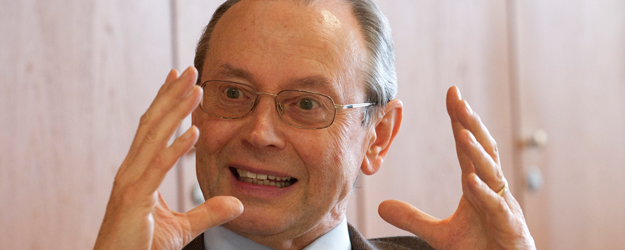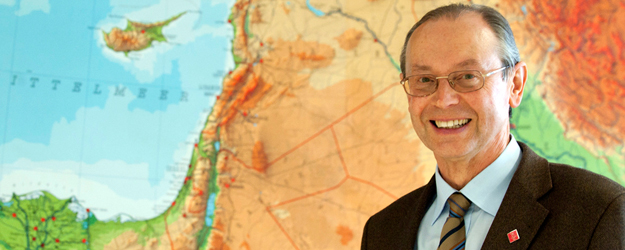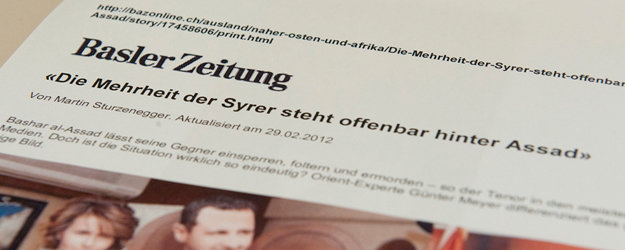11 April 2012
Günter Meyer is a popular interview partner when the crisis in Syria is the subject. Media representatives arrive in droves to talk with the professor, who works at the Institute of Geography at Johannes Gutenberg University Mainz (JGU). The expert on the Middle East is trying to correct the picture being propagated by mainstream journalism with its excessive bias in favor of the opposition.
As far as Günter Meyer is concerned, "Kofi Annan's six-point plan is the last opportunity to prevent chaos and civil war in Syria." However, Meyer believes there are other major complicating factors: "The US has no interest in promoting a peaceful solution that leaves Bashar al-Assad in power." And the Americans are not the only ones...
Ever since the onset of the Arab Spring, Professor Dr. Günter Meyer of JGU's Institute of Geography has been a popular interview partner for the media. "When it all started in Cairo, SWR decided to broadcast an 'ARD Brennpunkt' TV special focusing on the events. They were looking for an expert; I was available and suddenly I had 5.8 million viewers watching me at 8:15 pm. Everybody wanted to talk to me after that. My record was 18 interviews within 24 hours after they captured Qaddafi."
"It is like a second home for me"
The Middle East is one focus of Meyer's research. He holds various posts, such as Head of the Center for Research of the Arab World (ZEFAW) and Chairman of the German Middle East Studies Association for Contemporary Research and Documentation (DAVO). However, his interest in the Arab world and the events in Syria go much deeper. "My academic interests have resulted in my working in the region for almost four decades. It is like a second home for me and I see it as my duty to help bring about greater understanding."
There are various rolled up maps of the area deposited in a corner of his office. "When it comes to TV," says Meyer with a laugh, "they need something visual." It does seem that the geographer's attitude towards the media is essentially positive. However, as soon as the conversation turns to the crisis in Syria, he begins to frown. "I have never experienced such a mode of disinformation before. It is only in the last few weeks that the complete bias of the media has started to become somewhat more moderated."
Falsified videos of the crisis in Syria
Meyer points out that the opposition and other interest groups are running a carefully tailored campaign. "A huge amount of deliberately misleading video footage is being distributed. Even the wire service Reuters was taken in by one such example and sold a film showing the 2008 events in Lebanon as topical images of the Syrian crisis." Meyer cites a similarly egregious case: "Al-Jazeera was originally widely considered to be a dependable news source. Then outtakes surfaced of two journalists from the channel telling a young girl dressed up as a casualty what she needed to say before they started shooting, and persuading a doctor to give an inaccurate diagnosis of the status of the child. Systematic fraud is taking place. Al-Jazeera has generally lost its credibility in the Arabic world as a serious source of information." One thing to bear in mind is that the station is being financed by the Emir of Qatar. And Qatar is, alongside Saudi Arabia, the main opponent of Syria in the region. Both countries have conservative Sunni regimes.
"The picture painted by the media was initially accurate," concedes Meyer. "Assad used extreme brutality in an attempt to suppress peaceful demonstrators and imprisoned thousands. Now, however, the insurgents are not only showing a similar barbarity in their clashes with government troops, they are also expelling and murdering innocent civilians and sabotaging infrastructure. More and more Alawis and Christians, most of whom support the secular regime, are becoming the targets of opposition snipers." But still most reports adhere to the image created in the early stages. "The western media are slowly awakening to the fact that the opposition is also using extreme force and is receiving backing from al-Qaida supporters and Jihadis from Arab countries."
Assad is a nuisance to Americans
"Whether it be the US, France, or the United Kingdom - all have a clear policy of unilateral condemnation of the Assad regime. They believe there is a real chance of removing Syria from the Shiite axis, which is opposed to Israel." Assad is a nuisance, especially from the point of view of the US government. "His regime is one of the few in the Arab world that is almost always ready to pick a a fight with the US. This is the ideal opportunity to overthrow the regime."
However, at least half of the population supports Assad. "It is true that the rural areas where the rebellion started have been neglected over the past few years and a drought has exacerbated the situation but, at the same time, the residents of the largest cities - Damascus and Aleppo - have benefited from the regime's economic reforms. Most of the support for Assad is concentrated in such urban areas. So when two million people march in the streets as a sign of their support and the western media passes them off as paid lackeys, it is simply not true." In addition to this, all opponents of Assad do not necessarily automatically support the insurgents. "A lot of them are afraid of chaos, of civil war."
Preventing chaos and civil war
"If it comes to civil war, the country will explode. Annan's six-point plan is the final opportunity to prevent chaos and a civil war between the various ethnic and religious groups, in particular between the Sunni majority on the one hand and the Alawis and Christians on the other. Everything depends on the UN being able to monitor the implementation of the Annan plan," states Meyer.
But this will not be easy. There are a variety of groups jockeying for position within the opposition. First of all, there is the Syrian National Council. "It is composed almost exclusively of exiled Syrians and is dominated by the Sunni Muslim Brotherhood. They demand foreign intervention and a supply of weapons to violently topple Assad's Alawi regime. In its place, they intend to establish a theocratic regime that will receive support from the conservative Sunni monarchies of the Arabian peninsula." The National Coordination Committee for Democratic Change is opposed to them and it is made up of members of 13 opposition groups based in Syria. "They are primarily left-wing parties. They want an internal solution, negotiations with Assad, and the preservation of a secular government." Then there are the approximately 300 regional committees in Syria responsible for local coordination of the insurgency; these have the common goal of toppling the Assad regime. The fourth group is the Free Syrian Army that has its headquarters in Turkey. Various sources have placed its strength at between 2,000 and 40,000 deserters, who primarily use guerrilla tactics to fight the Syrian regime.
Internal Syrian solution or intervention?
"At the core of the quandary is the question of whether an internal Syrian solution can be found or whether intervention from outside is necessary. At the same time, ethnic and religious tensions are growing. And there is another problem: Even if the Syrian government compromises, the others will simply continue fighting." Meyer places his hopes in the deployment of UN observers. "They have to be there to determine who exactly is causing the violence."
Meyer currently spends three to four hours a day not only on studying the situation in Syria but also looking at other countries that have felt the impact of the Arab Spring. "I do research through the Internet and talk to Arab colleagues. Right now I am carrying out my university work at night and at weekends." Fourteen days ago he gave his 250th interview about the Arab Spring and this situation is unlikely to change in the near future. Günter Meyer's second homeland will not let him rest.
But given the opportunity to demonstrate just how specious the media coverage of the Syrian crisis is, even he manages to smile for the camera. Then he fetches a map from the corner of his office and shows the media what is really happening.



